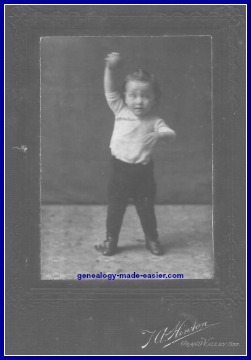- Home
- Organization
- Computer backups
- How to do backups
How To Backup Your Genealogy Research
CDs - DVDs - Photocopy - Scan
A current backup of your computer data is critical to your genealogy research, so how are you going to do it? Here are some tips for how to backup.
Some of you may have tape drives in your computer. Follow the instructions for the software that came with your drive to step through your backup.

Others of you have CD or DVD writer drives that let you copy data from your hard drive to one or more discs. You need to have a program on your computer that lets you do that. Most drives come with such a program. Sometimes, the amount of data you have is so large that it will not all fit onto a single disc, so your program must allow you to span your data across multiple discs.
You can put a second hard drive in your computer, and do a daily backup from your working drive to your backup drive. That way, if one drive fails, you can always use the other one. However, it does not solve the backup problem of a catastrophic failure to the house such as a fire or hurricane, or even a power surge that fries everything in and attached to your computer. So this works "sorta".
Investigate the web sites that allow you to buy storage space. You can use one of these to back up your data. Many people do that. Just remember then that you are not only depending on yourself to back up your data to your online storage area; you are also depending on the company that runs the site to back up their sites so your data is always available.
There are other external media which you can use for backup. These include Zip and Jaz drives, and removable hard drives attached to your computer. These contain disks which can be removed and stored off site.
The list above covers only the computer files you have. So the question is how to backup other data.
Don't forget about all the non-digital files you have stored with invaluable research data gathered over the years. What do you do with them for backup destinations?
If the genealogy data you are backing up is not digital in nature (computer files), then you have to approach how to backup all of it differently from digital media.
You may chose to photocopy documents and photographs and other materials rather than scanning them or printing them out. Again, your objective is to preserve the originals in a safe place, and use the copied materials in your ongoing family tree research.
If you have paper documents such as transcripts of interviews, letters sent to you by other researchers, photographs, or other printed documents, you might scan them into the computer. You then have a digital copy which can be backed up with your other digital files. You can also print the materials on your printer. Then you can save the original in a safe place, and use the backup copies for your every day genealogy use.
If you have audio and/or video tapes from interviews, family reunions, trips to cemeteries, and other research such as that, you will want to make duplicate copies of such tapes. Be sure to store the originals in a safe place, and use only the copies in your ongoing research. Copies of audio and video tapes can also be made on CD or DVD in a digital format for safe keeping.
If you have never performed a backup of your genealogy data before and you have never lost materials, you have been lucky beyond belief!
Backing up is vital, and knowing how to backup is the second step you need to know. The first is knowing what to backup.
In all cases, these tips would be remiss if they did not remind you that whatever media you use, immediately make certain to verify that you can read from it. You do not want to assume you are covered when you are not. So, as soon as you have finished the backup, try reloading your data from it - all the way through!
When your hard drive just failed is not the time to discover the only backup you have made is corrupted and unusable!
What do you need to copy? and When do you need to copy your data?
Where do you keep the files once you have copied it all? and How long do you keep your copies?
Backup and Verify To Keep Safe
Free Newsletter!!!
Find new tips and tricks here - new sources to check out
Click here to sign up for Genealogy Gems
I promise to use your email to send only the newsletter.
And if you ever decide to discontinue it, every issue has a form for stopping the newsletter.
How there's so much free information on this site ...
I have some affiliate links on this website. If you buy a product through them I receive a small commission at no extra cost to you. This helps keep the site free of charge.
To learn more, see my affiliate disclosure document.
Free Newsletter!!!
Find new tips and tricks here - new sources to check out
Click here to sign up for Genealogy Gems
I promise to use your email to send only the newsletter.
And if you ever decide to discontinue it, every issue has a form for stopping the newsletter.
How there's so much free information on this site ...
I have some affiliate links on this website. If you buy a product through them I receive a small commission at no extra cost to you. This helps keep the site free of charge.
To learn more, see my affiliate disclosure document.